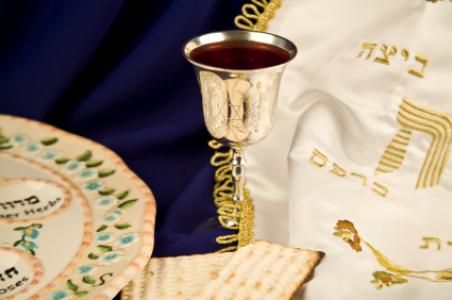
Yom Kippur
Yom Kippur is an important Jewish holiday that falls on the 10th day of the month of Tishrei in the Jewish calendar.
Many Jewish Americans celebrate Rosh Hashana (or Rosh Hashanah), which is also known as the Jewish New Year. Rosh Hashana starts on the first day of Tishrei (or Tishri), which is the seventh month in the Jewish calendar, and may last for two days. It is sometimes called the Day of Remembrance or the Day of Blowing the Shofar.
This is a state public holiday. State government offices are closed. Some schools and businesses may also be closed on this day.

The shofar is blown like a trumpet in the synagogue during Rosh Hashana.
©iStockphoto.com/tovfla
Many Jewish Americans observe Rosh Hashanah, known as the New Year in the Jewish calendar, for two days, while others celebrate the event for one day. It is a time of family gatherings, special meals and sweet foods. Many Jewish people celebrate Rosh Hashana by eating challah bread and apples dipped in honey.
Unlike the secular New Year in the Gregorian calendar (January 1), Rosh Hashana is a time of judgment and remembrance, on which God reviews and judges a person's deeds in the past year. It is a time of prayer and penitence. All debts from the past year are supposed to be settled before Rosh Hashana. Many Jewish people in the United States seek forgiveness from friends and family prior to this event.
Some Jewish people perform the tashlikh. This is the custom of reciting prayers near naturally flowing water, such as a stream or river, and symbolically throwing one’s sins away in the form of small pieces of bread or other food. Many Jewish people perform tashlikh from places such as the Brooklyn and Manhattan bridges in New York. Some people may use a fish pond or mikveh (ritual bath) if there is no local river or stream.
People of Jewish faith may take the day off work or organize time off during this time of the year, to observe the belief that no work is permitted on Rosh Hashanah. Much of the day is spent in synagogue, where the regular daily liturgy is expanded. The story of Abraham is read in synagogues and the shofar (ram’s horn) serves as a reminder that God allowed Abraham to sacrifice a ram instead of Abraham’s son, Isaac. The shofar is blown like a trumpet in the synagogue during this time of the year.
Rosh Hashana is not a federal public holiday in the United States. However, it can be taken as an optional holiday for state government employees in Texas. A chief judge of any judicial circuit in Florida can designate Rosh Hashana as a legal holiday for court employees within the state’s judicial circuit. Many Jewish organizations may be closed or have restricted opening hours on Rosh Hashana.
In the Jewish calendar, the year can begin on 2 different days. For religious purposes, it begins on the first day of Nisan. This makes the month of Tishrei the 7th month of the Jewish year. However, according to Jewish civil time reckoning, the year number changes on the first of Tishrei, the day of Rosh Hashana. So, since the months are usually numbered according to the religious calendar, the Jewish New Year technically begins on the 7th month of the year.
Rosh Hashana (or Rosh Hashanah) covers two of the 10 High Holy days that conclude with Yom Kippur, the Day of Atonement. Some sources say that the early Jewish calendar had four New Years, corresponding the seasons, with Rosh Hashana being one of the New Years.
Festivals to mark the beginning of a new year in the fall have been held since the earliest days of the Israelites. These took the form of prayers of thanks for the grain harvest. The custom of blowing trumpets on the 10th day of the month of Tishrei is first described in the vision of Ezekiel, a prophet who lived sometime around 600–500 BCE. This custom has continued into modern times.
The challah bread, which is eaten during Rosh Hashana, symbolizes the continuity of life. The apples that are dipped in honey symbolize sweetness and good health throughout the New Year. Some people also eat fish heads, which symbolize their desire to be on top, not the bottom, of life in the New Year. Pomegranates symbolize an abundance of goodness and happiness.
The shofar reminds people of Jewish faith that God allowed Abraham to sacrifice a ram instead of his Abraham’s son, Isaac. The tashlikh is an act that symbolizes throwing one’s sins in the water, so people believe that they are freed from their sins.
In the Jewish diaspora—Jewish communities outside of Israel—an extra day is usually added to religious observances, with the exception of Yom Kippur, which lasts only one day worldwide, and Rosh Hashana, which is celebrated over two days in both Israel and the diaspora.
This custom has its roots in ancient times when the beginning of the months in the Jewish calendar still relied on the sighting of the crescent Moon following a New Moon.
The beginning of a new month was determined by the Sanhedrin, the supreme court of ancient Israel in Jerusalem. Once the date was published, messengers were dispatched to spread the news among Jews living abroad. Since this process took some time, it was decreed that Jews outside of ancient Israel were to observe every holiday for 2 days to make sure that the rules and customs applicable to each holiday were observed on the proper date. This rule is still observed today.
| Year | Weekday | Date | Name | Holiday Type | Area |
|---|---|---|---|---|---|
| 2019 | Mon | Sep 30 | Rosh Hashana | State Holiday | Texas* |
| 2020 | Sat | Sep 19 | Rosh Hashana | State Holiday | Texas* |
| 2021 | Tue | Sep 7 | Rosh Hashana | State Holiday | Texas* |
| 2022 | Mon | Sep 26 | Rosh Hashana | State Holiday | Texas* |
| 2023 | Sat | Sep 16 | Rosh Hashana | State Holiday | Texas* |
| 2024 | Thu | Oct 3 | Rosh Hashana | State Holiday | Texas* |
| 2025 | Tue | Sep 23 | Rosh Hashana | State Holiday | Texas* |
| 2026 | Sat | Sep 12 | Rosh Hashana | State Holiday | Texas* |
| 2027 | Sat | Oct 2 | Rosh Hashana | State Holiday | Texas* |
| 2028 | Thu | Sep 21 | Rosh Hashana | State Holiday | Texas* |
| 2029 | Mon | Sep 10 | Rosh Hashana | State Holiday | Texas* |
| * Holiday is optional in Texas. | |||||
While we diligently research and update our holiday dates, some of the information in the table above may be preliminary. If you find an error, please let us know.

Yom Kippur is an important Jewish holiday that falls on the 10th day of the month of Tishrei in the Jewish calendar.

The last day of Passover marks the end of the Passover period, which lasts for seven or eight days.

Loyalty Day is a special day for people to reaffirm their loyalty to the United States and to recognize the heritage of American freedom.

Law Day in the United States is annually held on May 1.